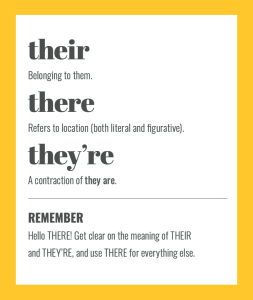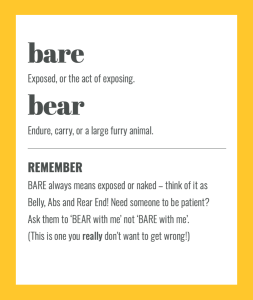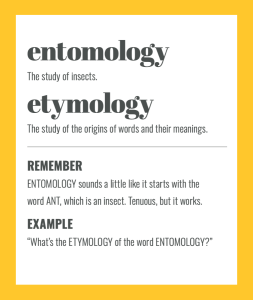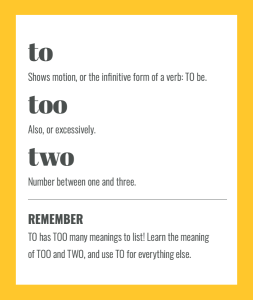Should you write ME or WE? Compelling reasons why small is beautiful when writing about your business

You’re a solo business owner writing for your business. Do you write ME or WE?
I’ve written hundreds of websites for hundreds of businesses.
Here’s my advice…
There’s a lot to think about when you’re starting a new business – least of all, getting your messaging right.
What’s your target market? Who are you trying to reach? And how do you stand out?
If you’re not a writer by trade, it’s tough.
I work with many ambitious business owners who’ve left the confines of a steady job for the bright lights and freedom of self-employment.
They usually come to me for help writing their website – and if you’ve been in their position, you’ll understand.
We can all write, but when it comes to talking about yourself – and particularly why you’re so great at what you do that people should buy from you – that British oh-god-I-just-can’t-it’s-all-too-cringy self-consciousness kicks in.
Information overload
And while no one knows your business like you do, that in itself can be problematic.
There’s so much you want to say, you simply don’t know where to start.
What makes you different? What do your customers need to know that will convince them to buy from you rather than your competitors?
You want to sound credible and capable, but it’s a thin line between confidence and arrogance.
What if you get it wrong?
You can’t see the wood for the trees.
Stand out from the crowd
Whatever industry you’re in – and whether you’re selling a product or a service – people deal with people, and personality in your marketing is vital.
Many businesses confuse the need to sound professional with sounding dull.
First drafts are often too wordy, too dense and too dry.
They lack sparkle, structure and brevity.
That special magic that makes them leap off the page and shout “pick me!” (without the desperation of actually saying it. That’d be all kinds of wrong.).
When you’re writing about your business, one of the questions I’m most often asked is whether to be open about being a sole trader and use me or to hide behind the guise of a larger business and use we.
Me or we?
Many sole traders decide to use the royal we (see the panel below) when they’re describing their business. It’s something I’m asked about a lot, and in almost all cases, I try to dissuade them.
Sure, in certain circumstances there are advantages of appearing to be a bigger company than you really are.
It could help you compete for a large contract.
But there’s nothing to stop you saying you call upon a team of trusted experts when you need to. (And no good can come of starting a working relationship based on anything other than honesty.)
Business today – good business, at least – is about authenticity, openness, and transparency.
Being proud of who you are and what you do, rather than pretending to be something you’re not.
If your business is just you, don’t be afraid to say so.
Here’s why…
Confidence
Using I and me rather than us and we in your marketing materials communicates self-belief. It may not be very British to say you’re amazing at what you do, but if you don’t believe it on at least some level, perhaps you should consider a change of career.
Consistency
Your clients and customers know they can expect a consistently high standard of work, delivered by you, and no one else. Chances are, that’s why they picked you in the first place.
Continuity
Rather than being passed from person to person, your clients get to develop a relationship with an expert. We’ve all experienced the disappointment of being sold to by the business owner, only to find ourselves dealing with an intern or junior member of the team when it comes to delivering the work. It’s not the path to excellent service.
Cost
Small can mean more affordable. It’s not always the case, but smaller businesses usually have lower overheads – which often means lower rates.
It takes guts to say, “I am my business. I may be small, but my god I’m good at what I do – and you’ll be glad you picked me”.
Do you have the confidence to stand alone?
Pro tip
Sometimes called ‘the majestic plural’, the expression ‘the royal we’ describes the use of the plural pronoun we in place of the singular pronoun, I when expressing a personal opinion.
The more common word for the use of we, us, or our instead of I, me or my is nosism.
There’ll vs they’ll: simple tips to help you remember
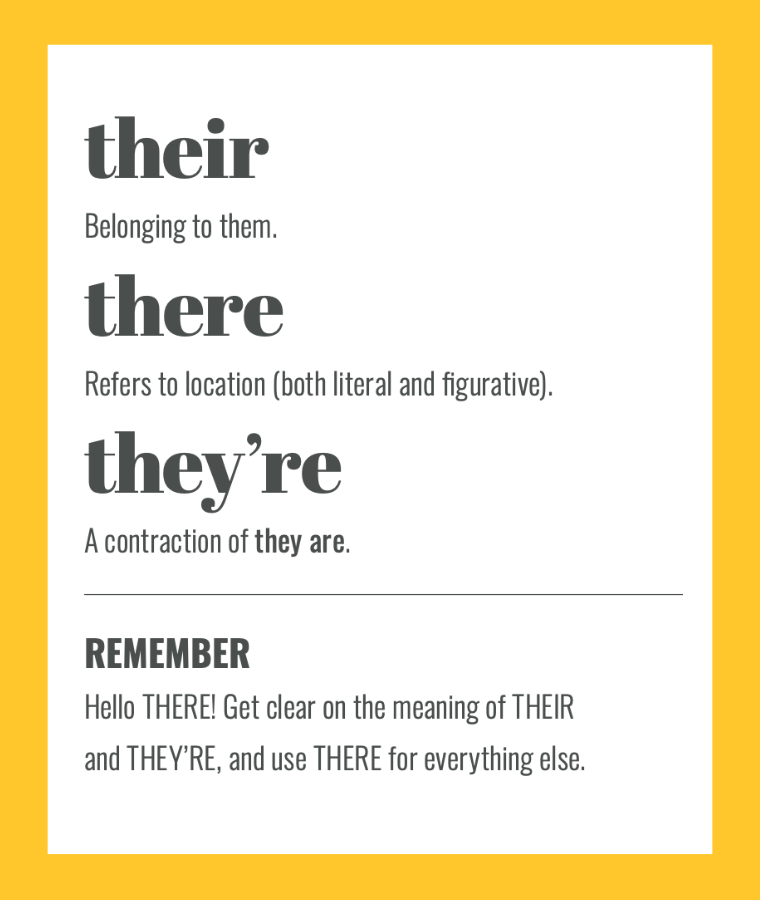
THERE’LL vs THEY’LL: which is which? Learn the difference
THERE’LL and THEY’LL are often confused but remembering the difference is easy when you know how. These simple tips will help you decide which word you need.
When to use there’ll
THERE’LL is a contraction of the words there + will = THERE’LL
The apostrophe in the word there’ll shows that there are letters missing – in this case, w and i.
Here are a couple of examples of the word there’ll used in a sentence:
“There’ll be trouble!” = “There will be trouble!”
“There’ll be blue birds over the white cliffs of Dover” = “There will be blue birds over the white cliffs of Dover”
When to use they’ll
THEY’LL is a contraction of the words they + will = they’ll.
It is the short version of:
Here’s how they’ll is used in a sentence:
“They’ll be late!” = “They will be late!”
“They’ll need a lie-in after their late night” = “They’ll need a lie-in after their late night”
In a nutshell, to remember the difference between there’ll and they’ll, start by writing the contraction in full, to see if you mean there or they.
Get more tips in The Little Book of Confusables
Bear vs bare: spelling tips to help you learn the difference
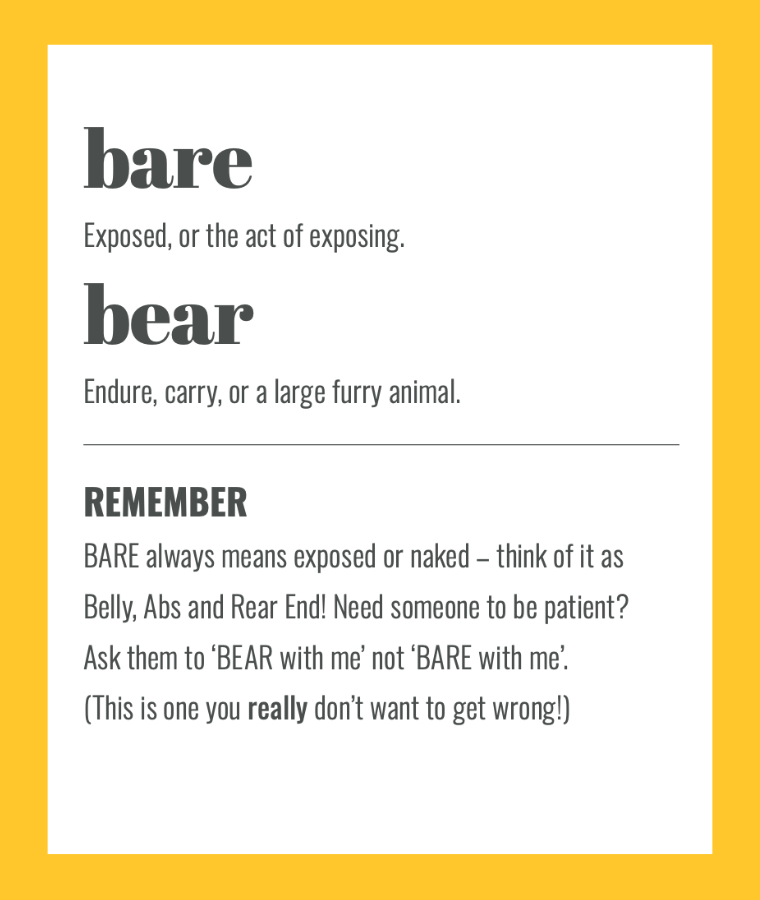
The words BEAR and BARE are easy to confuse – particularly when you’re using the expression bear with me, when there’s a world of a difference in meaning! This is one you really don’t want to get wrong!
Here are my simple tips to remember the difference between BEAR and BARE.
When to use bear
BEAR can be a noun or a verb.
As a verb, it means to carry or endure. You can use it in a sentence like this:
“Please bear with me for a moment.”
OR
“The pressure was hard to bear.”
As a noun, bear is a large animal.
For example:
“Winnie-the-Pooh is a famous bear.”
When to use bare
BARE can be a verb or an adjective.
As a verb, bare means to expose, like this:
“I will bare my soul and be completely honest.”
As an adjective, bare means exposed, like this:
“The gorilla beat his bare chest.”
Now you know the difference between bear and bare you can see that the phrases “bear with me” (please be patient) and “bare with me” (let’s get naked) should never be mixed up! I hope these tips help you to remember the difference between these commonly confused spellings in the future.
Get more tips in The Little Book of Confusables
Etymology vs entomology: easy ways to remember the difference
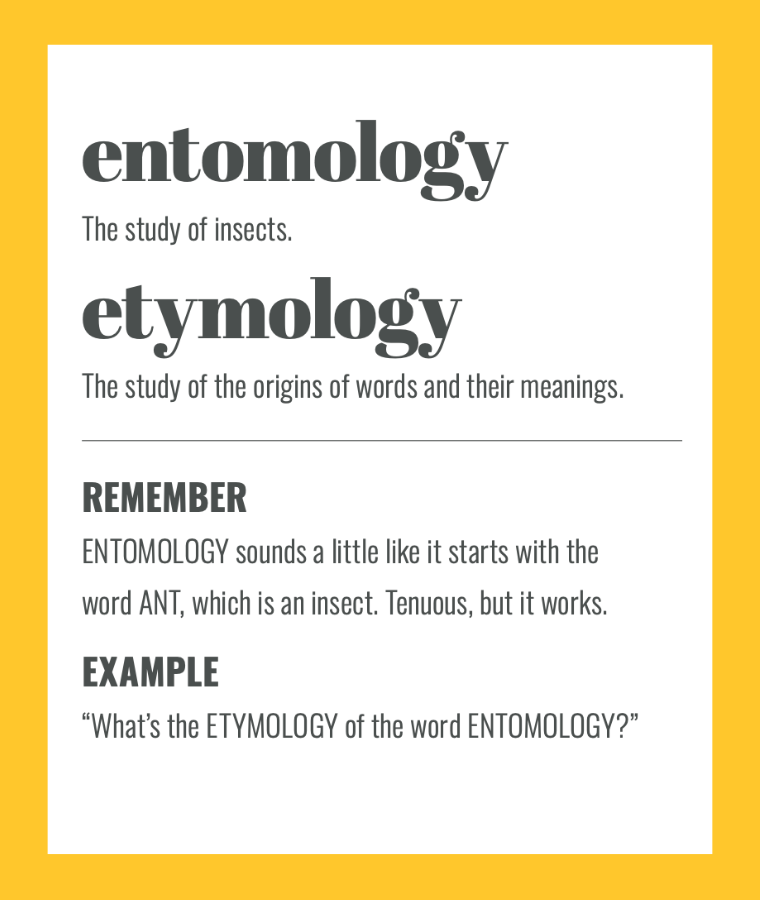
ETYMOLOGY vs ENTOMOLOGY: simple tips to remember the difference between these similar-sounding words.
When to use ETYMOLOGY
ETYMOLOGY is the study of the origins of words.
Here’s an example of the word etymology in a sentence:
“Jack had always been fascinated by the history of words. He loved etymology.”
When to use ENTOMOLOGY
ENTOMOLOGY is the study of insects.
To help you remember the difference between these similar-sounding words, ou might find it helpful to think of an insect nibbling away at a tomato plant: tomato = entomology.
Alternatively, an ant is an insect, and entomology has a similar beginning.
Here’s an example of the word entomology in a sentence:
“I decided to study entomology after enjoying A-level biology.”
PRO TIP
The suffix –logy means ‘the study of’. So, any time you see a word ending in this way, you’ll know it relates to the study of something.
Get more tips in The Little Book of Confusables
Too vs to vs two: simple tips to help you remember

TOO vs TO vs TWO – simple tips to remember the difference
TOO, TO and TWO are easy to confuse. They may sound the same but they have different uses. These simple tips will help you decide which word you need.
When to use too
TOO is an adverb meaning as well or excessively.
For example:
“I’m going to the park too.”
OR
“I can’t go because it’s too far.”
To help you remember which spelling you need, think O + O = as + well
OR
Two Ss in exceSSive and two Os in too
When to use to
To is a useful preposition that has several meanings. It’s also the most common of the three spellings.
It can be used to indicate a direction, goal, place of arrival or a period of time.
For example:
“I’m going to the shop.”
“The shop is open from 7am to 9pm.”
To can also be used to show the infinitive form of a verb, like this:
“I’m going to buy a newspaper” = to buy
“She needs to leave soon” = to leave
When to use two
Though it’s far less likely to be confused with to and too, the spelling two is the easy one to remember, as it’s only ever the number 2 spelled out.
For example:
“The park is two miles away.”
OR
“Just the two of us.”
I hope these tips help you remember the difference between too, to and two. Feel free to share your tips if you have a different way of remembering.


